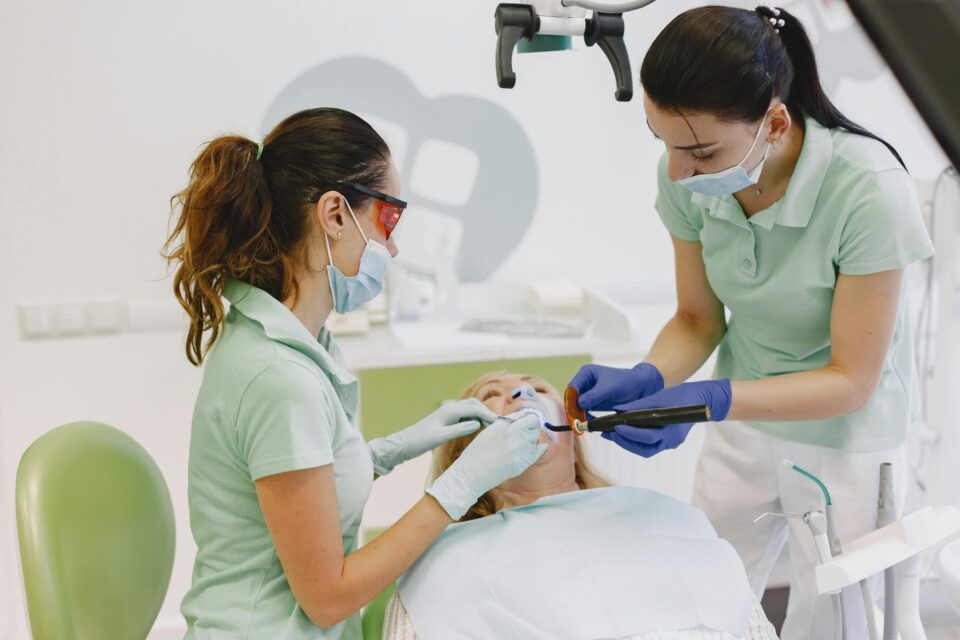When it comes to preventative dental care in North Carolina, dental hygienists are on the front lines. Dentists diagnose and treat disorders of the teeth and gums, whereas dental hygienists work to prevent those problems from occurring.
They clean teeth, do periodontal scaling and root planing, and educate patients on the proper oral hygiene practices they should follow at home to keep their smiles bright. Some dental hygienists can give numbing needles and take dental X-rays.
If this lucrative profession appeals to you, we’ve compiled a list of the best dental schools in NC to help you get started with the application process.
Top 7 Dental Schools in NC for 2024

1. University of North Carolina, Chapel Hill
The University of North Carolina is North Carolina’s first dental school and the only one that offers a baccalaureate-level dental hygiene degree.
To become a dental hygienist in North Carolina, you can enroll in either the certificate or bachelor’s programs at UNC. The underlying curriculum for both of these courses is the same; however, the baccalaureate-level program requires additional general education courses in liberal arts and social sciences. Depending on your job objectives, you can select between the two.
The certificate, which is comparable to an associate’s degree, takes two years to earn and leads to job opportunities in private and government dentistry clinics, hospitals, correctional facilities, and municipal health departments. A bachelor can potentially lead to teaching research.
In addition, to meet the demands of students seeking advanced jobs in the allied dentistry area, the college provides a 22-month Master’s in dentistry Hygiene program. You must have a bachelor’s degree in dental hygiene to be eligible for the program.
2. Wayne Community College, Goldsboro
Wayne Community College has played an important role in providing high-quality education during the past 50 years. Its faculty is highly educated and seeks to create a productive learning atmosphere that results in a favorable academic outcome.
This dental hygiene program in NC offers an associate degree that can be completed in four semesters. The training begins with an orientation, which briefs you on the learning environment and how to succeed in your chosen field. After finishing the full course, you will be proficient in executing oral hygiene operations such as scaling, polishing, obtaining X-rays, and administering preventive agents. You will also be able to take the National Board of Dental Hygiene exam and the North Carolina state licensure exam. As a licensed dental hygienist, you can work in dentists’ offices, hospitals, schools, and dental supply stores.
3. Central Carolina Community College in Sanford
Central Carolina Community College provides high-quality dental education in a modern facility with cutting-edge equipment. Industry relationships provide students with outstanding clinical experiences and internship opportunities, which frequently lead to permanent employment placements.
Every fall, the institution begins offering an Associate Degree in Dental Hygiene. This five-semester program allows you to complete some of your education online, giving you a lot more flexibility with your schedule. To graduate, students must complete 71 credits in human anatomy, physiology, orofacial anatomy, infection control, dental radiography, biological chemistry, dental pharmacology, and dental materials.
To foster professional development, the college encourages students to actively participate in the events and activities of the American Dental Hygienists Association and other comparable organizations.
4. Asheville-Buncombe Technical Community College, Asheville
Ashville-Buncombe Technical Community College prepares students to confidently handle the demands of an allied dental career. Furthermore, its gorgeous campus, nestled in the mountains, provides a fascinating blend of tranquility and vibrant culture, with several recreational opportunities nearby.
By finishing this Associate in Applied Science program, you will be a valuable member of the dental team, working independently with patients to design and administer dental hygiene services.
The challenging program spans five semesters and includes intensive didactic, lab, and clinical experiences. You will learn how to do patient care tasks such as teeth cleaning, scaling, administering preventive agents, obtaining x-rays, and assessing and arranging oral care. Before beginning the first semester, the college requires you to take general education classes in anatomy, physiology, and biochemistry.
5. Halifax Community College, Weldon.
Halifax Community College’s campus provides the convenience of being close to North Carolina’s major centers while also offering the peace and quiet of a rural setting. The picturesque Lake Gaston, which sits nearby, adds to the calm of the area.
This 73-credit dental hygiene associate degree will provide a wealth of work prospects in the ever-expanding allied dental industry. During the two-year intense training program, you will learn to deliver dental hygiene treatment while also working as part of a collaborative dental care team.
Before enrollment, you must have some level of dental assisting experience to determine whether this is the correct vocation for you and what to expect from your training. After completing the coursework, you can take the state licensure and national dental hygiene board exams.
6. Fayetteville Technical Community College in Fayetteville
Fayetteville Technical Community College is a dental hygiene school in North Carolina that prepares students for a successful allied dentistry career. In order to assist the community, the institution has a dental hygiene clinic on its campus, where patients can receive a wide range of dental services. The clinic also allows students to observe and experience the day-to-day operations of a dental hygienist at close quarters.
This five-semester associate degree program will provide you with the theoretical information and abilities necessary to clean teeth, remove plaque, take x-rays, record patient history, perform scaling, and teach patients about oral hygiene.
Aside from the core curriculum, attending general education classes in anatomy, physiology, microbiology, computer basics, and public speaking will help you become proficient in patient communication while also ensuring that you acquire a comprehensive education. To be qualified for this program, you must finish prerequisite courses in biology, algebra, and chemistry.
7. Central Piedmont Community College, Charlotte
Central Piedmont Community College’s dental clinic provides considerable hands-on training. Even before you have your first job, you study the complexities of this profession by treating patients under the supervision of a teaching member.
The 76-credit-hour, full-time Associate in Applied Science Degree is offered in the autumn, with a maximum enrollment of 25 to 30 students per year. The curriculum takes six semesters to complete, and before joining, you must complete a chemistry course and pass the CPR and First Aid exam.
The curriculum comprises general education classes in anatomy and physiology, microbiology, expository writing, public speaking, algebra, and sociology. The well-rounded curriculum, combined with fundamental courses in dental hygiene, prepares you to work in a variety of settings, including dental offices, schools, dental material firms, and research institutes.
What are the North Carolina Dental School Requirements?
Admission standards for dentistry schools in North Carolina differ by institution. However, prospective students are often required to have a minimum undergraduate GPA, DAT results, and an essay stating why they want to work in dentistry. They may also need to show clinical and shadowing experience.
Furthermore, certain dental schools in North Carolina may want letters of recommendation from professors or dentists, as well as an interview with the admissions committee. Prospective students should examine the exact requirements for each institution to which they want to apply and begin preparing early to ensure that they meet all of the essential prerequisites.
Tuition and Fees for Dental Schools in North Carolina
Dental school tuition in North Carolina varies by institution and program. According to the American Dental Association, the average tuition for dental students in the United States was $37,877 for the 2020-21 school year. However, tuition at NC dental schools ranges from $20,000 to $36,000 per year.
In addition to tuition, dental students in North Carolina must pay laboratory costs, equipment fees, and clinical expenses. These fees can amount to several thousand dollars per year, depending on the program and school.
Fortunately, there are several financial aid opportunities available to dentistry students in North Carolina. These include scholarships, grants, and loans. Some schools also provide work-study programs or part-time jobs for students to help offset the expense of tuition and fees.
FAQs
How many dental schools are in NC?
North Carolina has four dental schools: The University of North Carolina at Chapel Hill School of Dentistry, East Carolina University School of Dental Medicine, Campbell University School of Osteopathic Medicine, and A.T.
How long is dental school in NC?
Dental school requires a four-year commitment.
Does Charlotte, NC, have a dental school?
For the past 75 years, the UNC Adams School of Dentistry has trained the greatest and brightest oral health care practitioners in North Carolina, the nation, and beyond.
Does the University of North Carolina have a dental program?
When you enroll in the University of North Carolina at Chapel Hill Adams School of Dentistry Doctor of Dental Surgery degree, you are committed to more than just providing excellent care after four years.
What is the easiest dental school to get into?
- Lincoln Memorial University: 26.94%
- University of Utah 25.73%
- New York University: 25.49%
- Oregon Health & Science University: 24.78%
- East Carolina University: 23.19%
- University of Detroit Mercy: 22.64%
- California Northstate University: 22.29%
Conclusion
North Carolina is a great place for prospective dentists who want to further their education and advance their careers. With its top-tier dental schools, diversified population, developing economy, and numerous extracurricular activities, the state provides an ideal environment for students to pursue their ambition of becoming dentists.


